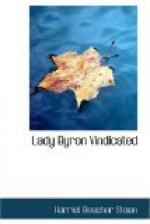This conviction we arrive at while as yet we are deprived of the statement prepared by Lady Byron, and the proof by which she expected to sustain it; both which, as we understand, are now in the hands of her trustees.
CHAPTER VI. PHYSIOLOGICAL ARGUMENT.
The credibility of the accusation of the unnatural crime charged to Lord Byron is greater than if charged to most men. He was born of parents both of whom were remarkable for perfectly ungoverned passions. There appears to be historical evidence that he was speaking literal truth when he says to Medwin of his father,—
’He would have made a bad hero for Hannah More. He ran out three fortunes, and married or ran away with three women . . . He seemed born for his own ruin and that of the other sex. He began by seducing Lady Carmarthen, and spent her four thousand pounds; and, not content with one adventure of this kind, afterwards eloped with Miss Gordon.’—Medwin’s Conversations, p.31.
Lady Carmarthen here spoken of was the mother of Mrs. Leigh. Miss Gordon became Lord Byron’s mother.
By his own account, and that of Moore, she was a passionate, ungoverned, though affectionate woman. Lord Byron says to Medwin,—
’I lost my father when I was only six years of age. My mother, when she was in a passion with me (and I gave her cause enough), used to say, “O you little dog! you are a Byron all over; you are as bad as your father!"’—Ibid., p.37.
By all the accounts of his childhood and early youth, it is made apparent that ancestral causes had sent him into the world with a most perilous and exceptional sensitiveness of brain and nervous system, which it would have required the most judicious course of education to direct safely and happily.
Lord Byron often speaks as if he deemed himself subject to tendencies which might terminate in insanity. The idea is so often mentioned and dwelt upon in his letters, journals, and conversations, that we cannot but ascribe it to some very peculiar experience, and not to mere affectation.
But, in the history of his early childhood and youth, we see no evidence of any original malformation of nature. We see only evidence of one of those organisations, full of hope and full of peril, which adverse influences might easily drive to insanity, but wise physiological training and judicious moral culture might have guided to the most splendid results. But of these he had neither. He was alternately the pet and victim of his mother’s tumultuous nature, and equally injured both by her love and her anger. A Scotch maid of religious character gave him early serious impressions of religion, and thus added the element of an awakened conscience to the conflicting ones of his character.
Education, in the proper sense of the word, did not exist in England in those days. Physiological considerations of the influence of the body on the soul, of the power of brain and nerve over moral development, had then not even entered the general thought of society. The school and college education literally taught him nothing but the ancient classics, of whose power in exciting and developing the animal passions Byron often speaks.




